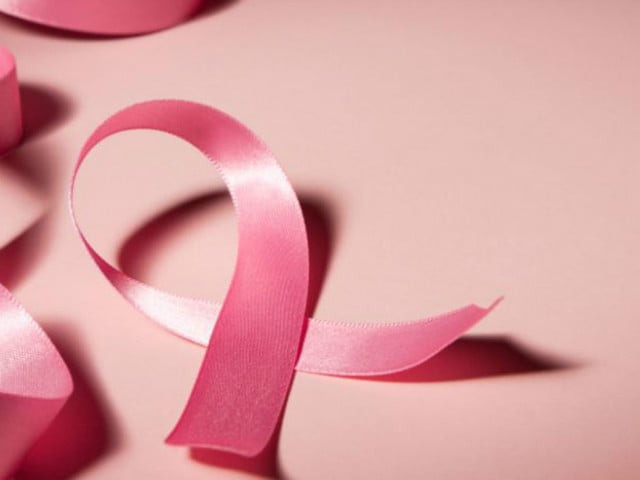Know yourself: Self-examination tips to detect breast cancer
Here are some dos and don'ts to reduce the risk

Here are some dos and don'ts to reduce the risk.
PHOTO: BIMCBALI
A two-day event was held at Dolmen Mall Clifton, Karachi where many women flocked the Pinktober booth for consultation and advice from the expert present.

"This year our campaign encompasses an expert’s consultation. We distributed pamphlets to teach self-examination at home and we are also raising money for Pink Ribbon's breast cancer hospital in Lahore, which will be the first of its kind in Pakistan," said the Triumph team while speaking to The Express Tribune.
Women’s health: Park goes pink for breast cancer awareness

The Triumph team disclosed that the incidences of breast cancer in Pakistan have increased at an alarming rate: "One out of every nine women is suffering from it. And the rate is even higher in women above 45, as every one out of five women is being diagnosed with it."
Breast cancer: Think pink
Dr Rufina Soomro, Breast Care Consultant, revealed, "The highest rates of incidences in Asia have been reported in Pakistan, hence making it the most common cancer in the country."
"In the West, with the help of screening tests, women are diagnosed at stage 1. Whereas in Pakistan, less than 10% of women are diagnosed at stage 1 due to lack of awareness and adequate health services," she added.
The whole idea behind this particular campaign was to help women undergo self-examination for prevention. "It's not easy to detect breast cancer since you don’t feel the pain. Pamphlets are freely available everywhere to help you detect the signs through Breast Self Examination (BSE)," said Dr Rufina.
Here are three simple steps to detect breast cancer:
 Triumph pamphlet
Triumph pamphletDr Rufina also emphasised on having a professional examination done once a month. "Because any difference you notice may not be a cancer. Almost 90% of the time the lump is non-cancerous," she said.
Furthermore, cancer is not always inherited. Your lifestyle plays a very important role in it's prevention.
Perception on breast cancer has evolved: Mahira Khan
During the campaign, women were alerted to refrain from Hormone Replacement Therapy (HRT) at menopause and also from smoking and drinking, as it may increase the risk by 30 per cent. They were also advised to exercise regularly and eliminate fat, sugar and full fat dairy products from their diets.
High intake of fats not only increases the risk of breast cancer, but could also lead to colon and prostate cancer. It is ideal to keep the fat intake 20 per cent or less of your total intake.
The following foods are recommended by Ruth Spear, author of Low Fat and Loving it, to reduce the risk of breast cancer:
Fibers:
Make fresh fruits, vegetables, whole-grain breads, cereals, cooked and dried peas, and beans a part of your daily routine. Also, eat apples, pears, peaches, potatoes, etc with their skin.
 PHOTO: FIBER RICH DIET
PHOTO: FIBER RICH DIETVitamin A, C and Betacarotene:
Increase consumption of leafy dark green vegetables and other green vegetables, along with red, orange and yellow vegetables and fruits -- especially citrus fruits and their juices.
 PHOTO: ALL WOMENS TALK
PHOTO: ALL WOMENS TALKCruciferous vegetables:
The cabbage family falls under this category. Eat broccoli, bok choy, brussels sprouts, cabbage, cauliflower, collards, kale, mustard greens, etc.
 PHOTO: ZON NEWS
PHOTO: ZON NEWSLow-fat dairy products:
They contain essential proteins, vitamins and minerals. Avoid whole milk or cream.
 PHOTO: PINTEREST
PHOTO: PINTERESTSeasonal vegetables:
Replace fats and salts with seasonal vegetables with herbs, spice and lemon juice.
 PHOTO: PINTEREST
PHOTO: PINTERESTFinal word:
Cooking methods count! Steam, roast, poach, or microwave without adding extra fat. If you do broil, grill or barbeque, place grills or racks as far as possible from the heat source. Cook slowly and wrap foods in foil.


















COMMENTS
Comments are moderated and generally will be posted if they are on-topic and not abusive.
For more information, please see our Comments FAQ